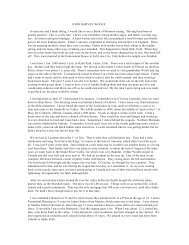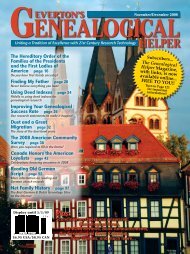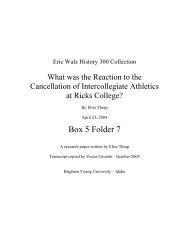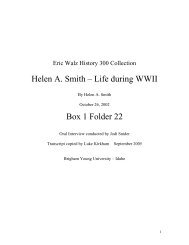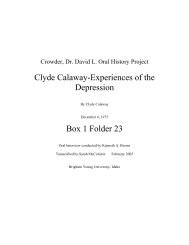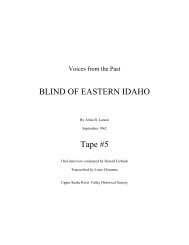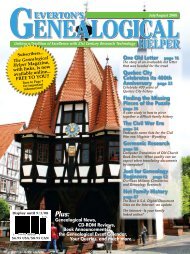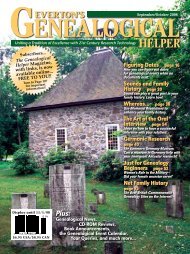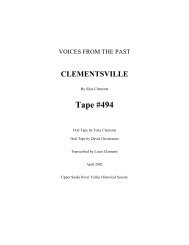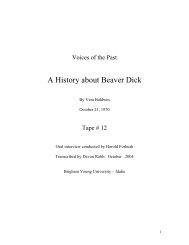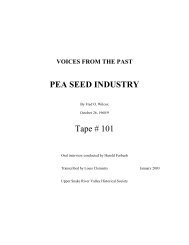HelPeR - BYU Idaho Special Collections and Family History
HelPeR - BYU Idaho Special Collections and Family History
HelPeR - BYU Idaho Special Collections and Family History
You also want an ePaper? Increase the reach of your titles
YUMPU automatically turns print PDFs into web optimized ePapers that Google loves.
other items or events in your life in the same manner;<br />
therefore, you go through life never experiencing the<br />
benefits of seeing the alternatives.<br />
Now take the same group of objects <strong>and</strong> reorganize<br />
them using another principle of organization, perhaps<br />
from the list suggested in the above paragraph. When<br />
you have finished your second organization, compare<br />
it to the first. What did you find You should have<br />
found that these same objects have taken on a new<br />
meaning. In other words, you have exp<strong>and</strong>ed your<br />
imagination by perceiving things about the objects<br />
you had not noticed before. Repeat this organizational<br />
process at least five more times using a different organizing<br />
principle <strong>and</strong> then compare the results with<br />
all others. This game played on a regular basis with<br />
new objects will gradually increase<br />
your potential for seeing possibilities<br />
where you saw none before, in<br />
a word; your imagination has been<br />
stimulated <strong>and</strong> some of your biases<br />
have been minimized.<br />
Another game I like to play involves<br />
the use of a sturdy chair.<br />
Select one from your collection,<br />
set it in an open space, <strong>and</strong> see if<br />
you can discover at least ten different<br />
ways that you can sit in that<br />
chair. Again, the challenge here is<br />
to stretch the use of your imagination<br />
<strong>and</strong> thereby ridding yourself<br />
of the negative biases that told you<br />
the “proper” way to sit in a chair.<br />
How many different ways to sit<br />
did you discover If you could find at least five, you<br />
have gone a long way in opening yourself to new<br />
possibilities. If you found ten, super!<br />
There are many games of this type. Some that I<br />
still play are crossword puzzles. These puzzles force<br />
you to look at words in completely different ways if<br />
you want to be successful in the puzzle’s solution.<br />
Crossword puzzles are found in most newspapers,<br />
or in books found in bookstores. My local newspaper<br />
also carries other games I play to keep my imagination<br />
sharp. One is called “Jumble: The Scrambled<br />
Word Game,” <strong>and</strong> the other “Celebrity Cipher.” Both,<br />
if played on a consistent basis, cause one to see that<br />
what is present is not all that meets the eye.<br />
For those who have computers, some of the card<br />
games (Free Cell <strong>and</strong> Spider) may be helpful. Also,<br />
…open yourself to<br />
all the possibilities<br />
that a document<br />
contains rather<br />
than focusing on<br />
only one aspect that<br />
might have been<br />
recommended by<br />
some expert, book,<br />
magazine article,<br />
or family member.<br />
playing bridge provides an excellent opportunity<br />
to exp<strong>and</strong> your vision. The card games mentioned<br />
become very good entries to a process that requires<br />
examination of a great many options in order to win.<br />
Card games of pure chance will not work because<br />
they do not force you to stretch in the same way that<br />
the games mentioned do. The game of chess accomplishes<br />
the same thing as card games.<br />
I firmly believe playing all of these games will go<br />
a long way in opening your mind to new possibilities<br />
where perhaps none were perceived before. They will<br />
help free you of some controlling biases that may be<br />
impeding your genealogical research. The question<br />
remains; How do we free ourselves from these negative<br />
biases I can only provide you with how I freed<br />
myself. Ridding me of the negative<br />
biases that I suspected were<br />
getting in the way began with<br />
the recognition that I was dealing<br />
with both mental <strong>and</strong> emotional<br />
issues. The games suggested earlier<br />
helped with the mental aspect<br />
by providing me with the tools to<br />
see that there was more than one<br />
way to skin a cat, they exp<strong>and</strong>ed<br />
my abilities for seeing things in<br />
a different way than I originally<br />
thought possible. The emotional<br />
side was a little more difficult, but<br />
eventually I was able to move away<br />
from this issue by believing that<br />
those who helped form some of my<br />
biases did the best they could at<br />
that time with the information they had. They really<br />
meant no harm, but now times had changed. Having<br />
worked through these two notions, I was now ready<br />
to see how my genealogical research would change.<br />
The first application I made of my new-found freedom<br />
lay in the perhaps the most fundamental search<br />
done in genealogy, the surname search. I came to<br />
realize that perhaps my genealogy instructor was<br />
correct when she told me that my last name was<br />
not necessarily spelled in many records the way it<br />
is spelled today. I dismissed her observation at that<br />
time, but after going through the games, seeing that<br />
other possibilities were possible, I at least thought I<br />
could test her out. She suggested going to www.familysearch.org<br />
<strong>and</strong> searching for my surname. I did,<br />
<strong>and</strong> found quite a number of variant spellings that<br />
32 © Ev e r t o n’s Ge n e a l o g i c a l He l p e r Ja n ua ry/Fe b r u a r y 2009



